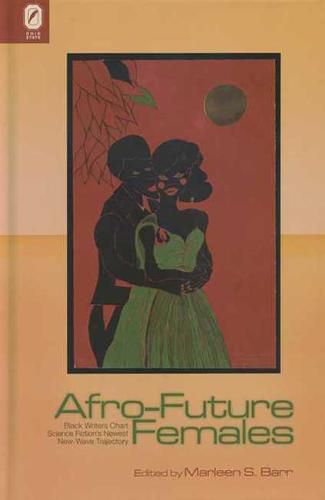Readings Newsletter
Become a Readings Member to make your shopping experience even easier.
Sign in or sign up for free!
You’re not far away from qualifying for FREE standard shipping within Australia
You’ve qualified for FREE standard shipping within Australia
The cart is loading…






This title is printed to order. This book may have been self-published. If so, we cannot guarantee the quality of the content. In the main most books will have gone through the editing process however some may not. We therefore suggest that you be aware of this before ordering this book. If in doubt check either the author or publisher’s details as we are unable to accept any returns unless they are faulty. Please contact us if you have any questions.
Afro-Future Females: Black Writers Chart Science Fiction’s Newest New-Wave Trajectory, edited by Marleen S. Barr, is the first combined science fiction critical anthology and short story collection to focus upon black women via written and visual texts. The volume creates a dialogue with existing theories of Afro-Futurism in order to generate fresh ideas about how to apply race to science fiction studies in terms of gender. The contributors, including Hortense Spillers, Samuel R. Delany, Octavia E. Butler, and Steven Barnes, formulate a woman-centered Afro-Futurism by repositioning previously excluded fiction to redefine science fiction as a broader fantastic endeavor. They articulate a platform for scholars to mount a vigorous argument in favor of redefining science fiction to encompass varieties of fantastic writing and, therefore, to include a range of black women’s writing that would otherwise be excluded. Afro-Future Females builds upon Barr’s previous work in black science fiction and fills a gap in the literature. It is the first critical anthology to address the blackness of outer space fiction in terms of feminism, emphasizing that it is necessary to revise the very nature of a genre that has been constructed in such a way as to exclude its new black participants. Black science fiction writers alter genre conventions to change how we read and define science fiction itself. The work’s main point: black science fiction is the most exciting literature of the nascent twenty-first century.
$9.00 standard shipping within Australia
FREE standard shipping within Australia for orders over $100.00
Express & International shipping calculated at checkout
This title is printed to order. This book may have been self-published. If so, we cannot guarantee the quality of the content. In the main most books will have gone through the editing process however some may not. We therefore suggest that you be aware of this before ordering this book. If in doubt check either the author or publisher’s details as we are unable to accept any returns unless they are faulty. Please contact us if you have any questions.
Afro-Future Females: Black Writers Chart Science Fiction’s Newest New-Wave Trajectory, edited by Marleen S. Barr, is the first combined science fiction critical anthology and short story collection to focus upon black women via written and visual texts. The volume creates a dialogue with existing theories of Afro-Futurism in order to generate fresh ideas about how to apply race to science fiction studies in terms of gender. The contributors, including Hortense Spillers, Samuel R. Delany, Octavia E. Butler, and Steven Barnes, formulate a woman-centered Afro-Futurism by repositioning previously excluded fiction to redefine science fiction as a broader fantastic endeavor. They articulate a platform for scholars to mount a vigorous argument in favor of redefining science fiction to encompass varieties of fantastic writing and, therefore, to include a range of black women’s writing that would otherwise be excluded. Afro-Future Females builds upon Barr’s previous work in black science fiction and fills a gap in the literature. It is the first critical anthology to address the blackness of outer space fiction in terms of feminism, emphasizing that it is necessary to revise the very nature of a genre that has been constructed in such a way as to exclude its new black participants. Black science fiction writers alter genre conventions to change how we read and define science fiction itself. The work’s main point: black science fiction is the most exciting literature of the nascent twenty-first century.